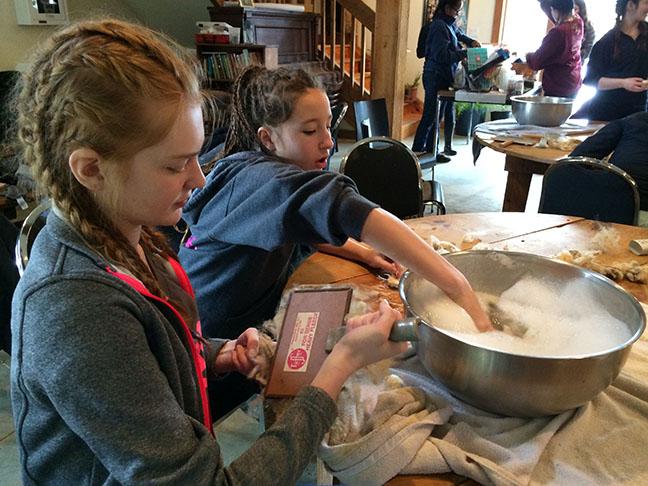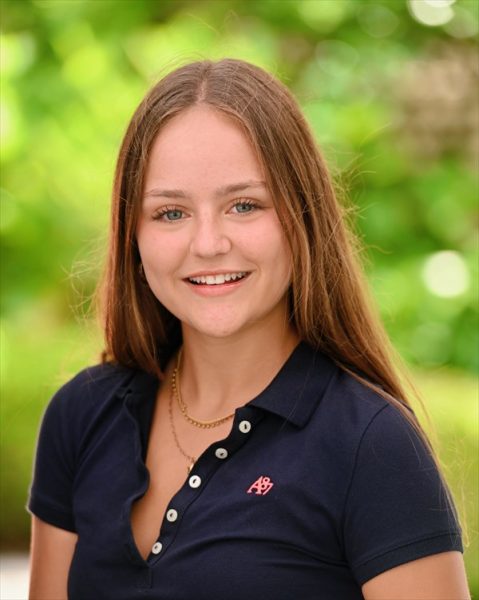Sprout Creek Farm program gives visitors a farmlife experience
Freshmen Dayne Coulter (left) and Jac Antakli (right), who attend Academy of the Sacred Heart in Bloomfield Hill, Michigan, take sheep wool and make it into felt.
May 1, 2015
Claire Kosewic
Reporter
The farm is open to elementary through high school age students for camps and service projects each summer, but students who attend Sacred Heart schools are eligible to participate in special, longer programs focusing especially on food insecurity and the social justice issues surrounding it. For more information, see the farm’s website http://sproutcreekfarm.org.
When Amanda Bradley’s alarm goes off at 5:30 a.m., she gets into a pair of long pants, two pairs of socks, a flannel shirt and a fleece sweatshirt, leaves the bunkhouse and heads to the barns for morning chores.
Bradley’s morning quickly became routine for her and her classmates from the Academy of the Sacred Heart in Bloomfield Hills, Michigan who were participating in a week-long immersion program at Sprout Creek Farm. The farm is a fully-functioning dairy farm and fromagerie in Poughkeepsie, New York.
“We were realizing that schools at that time were not geared to address the issues that were beginning to show and the problems that needed adjustments, but it was also not at all clear how those problems should be addressed,” Sister Margo Morris, a Religious of the Sacred Heart and one of the founders of the farm, said.
Morris and the two other sisters then teaching at Convent of the Sacred Heart in Greenwich, Connecticut concluded a farm would be the perfect vehicle for giving their students a sense of self-worth and an understanding of the wider world while giving them a sense of responsibility and then accomplishment.
“There were plenty of adventure and leadership programs out there, and we realized that while everyone enjoyed those, they had very little lasting impact,” Morris said. “Eventually the lessons students learned faded, and they were left with very little to work with later on.”
With no money and no farming experience, the sisters began their experiment on the school campus.
“It was a real ramshackle old thing,” Morris said. “We used old construction pallets to make animal pens and had a sail from an old sailboat for a barn door, but we all loved it, and were willing to work hard to get it off the ground.”
None of the founders of the farm could have predicted how fast the idea would take off, according to Morris.
“What made it successful was that it was exactly what everyone — both kids and adults — needed, even though no adult wanted to admit it,” Morris said. “There’s this huge spiritual dimension of what it means to be human, and people who came to the farm for anything walked away completely understanding it.”
Students and teachers learned how to care for animals and raise produce, but they also began to question social justice issues such as why people are hungry and why access to fresh, healthy food is so limited when their small piece of land was able to produce so much, according to Morris.
The estate of Elise Kinkead offered the sisters her farmland in Poughkeepsie in 1987 as a permanent home for the farm, which today has grown into a nonprofit farm raising cows, sheep, goats and chickens as “an educational center offering programs for young people to come and connect with the land,” according to the farm’s website.
“It’s a perfect symbiosis of a teaching environment where you have value, you have intellectual challenge, you have social challenge and you have economic and societal challenge,” Morris said. “Then you have this beautiful experience where you learn about creatures that are not human and how they function and their places in our community.”
Aside from working on the farm and learning about how food is grown and distributed, Bradley valued the time she spent there with her class.
“The best part of the whole week I spent there was forming connections with my classmates,” Bradley said. “When you’re away with someone for a whole week, you really get to know them, and I learned a lot about my classmates who I’ve known for years.”
Sprout Creek Farm program participants do a lot of physical work and really get their hands dirty, according to Kendall Gassman, one of Bradley’s classmates who was participating in the immersion program.
“We worked really hard the whole time we were there, from doing farm chores like milking cows and goats to helping out in the kitchen,” Gassman said.
The idea that stuck with both girls was that hard work pays off, and it’s always worth pushing yourself a little harder in order to get the most out of anything, which is in keeping with the original mission of the sisters who started the farm.
“It’s supposed to be a new experience where you have new awakenings of intellectual growth, where you’re supposed to learn something about yourself and challenge yourself, which I most definitely did,” Bradley said.
The farm is open to elementary through high school age students for camps and service projects each summer, but students who attend Sacred Heart schools are eligible to participate in special, longer programs focusing especially on food insecurity and the social justice issues surrounding it. For more information, see the farm’s website http://sproutcreekfarm.org.










